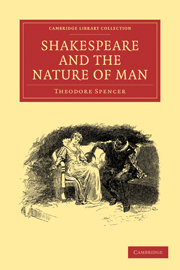Book contents
- Frontmatter
- Preface
- Contents
- SHAKESPEARE and THE NATURE OF MAN
- I Man in Nature: the Optimistic Theory
- II Man in Nature: the Renaissance Conflict
- III The Dramatic Convention and Shakespeare's Early Use of It
- IV Hamlet and Troilus and Cressida
- V Othello and King Lear
- VI Macbeth and Antony and Cleopatra
- VII Shakespeare's Last Plays
- VIII Literature and the Nature of Man
- Index
III - The Dramatic Convention and Shakespeare's Early Use of It
Published online by Cambridge University Press: 07 September 2010
- Frontmatter
- Preface
- Contents
- SHAKESPEARE and THE NATURE OF MAN
- I Man in Nature: the Optimistic Theory
- II Man in Nature: the Renaissance Conflict
- III The Dramatic Convention and Shakespeare's Early Use of It
- IV Hamlet and Troilus and Cressida
- V Othello and King Lear
- VI Macbeth and Antony and Cleopatra
- VII Shakespeare's Last Plays
- VIII Literature and the Nature of Man
- Index
Summary
What I have been saying so far has concerned the first of the three aims which this book is trying to achieve: an understanding of Shakespeare's intellectual background. We must now turn to the second of those aims: an understanding of Shakespeare's craft, namely, the development in the sixteenth century and in Shakespeare's own early plays, of the particular dramatic technique which enabled him to use, at the height of his powers, the deep conflict about man's nature which was given him by his age. Having described what was taken for granted when people thought of man's nature, we must now describe what was taken for granted when people thought of a play. And since, by Shakespeare's time, the drama had long roots in the past and was the product of a long tradition, we must begin by emphasizing certain features of that tradition and by trying to explain their significance for our understanding of Shakespeare.
The medieval drama, as everyone knows, had grown up inside the church, and though an occasional morose preacher complained that it did more harm than good, it was usually approved by the authorities. And naturally so. For its chief subject matter was just that which it was the main business of the church to expound. In the fifteenth century, when we may say that medieval drama was at its height, that drama did what every other serious form of literature did at the same time: it interpreted the two books, the book of the Scriptures and the book of Nature, which God had given to man.
- Type
- Chapter
- Information
- Shakespeare and the Nature of Man , pp. 51 - 92Publisher: Cambridge University PressPrint publication year: 2009First published in: 1943



